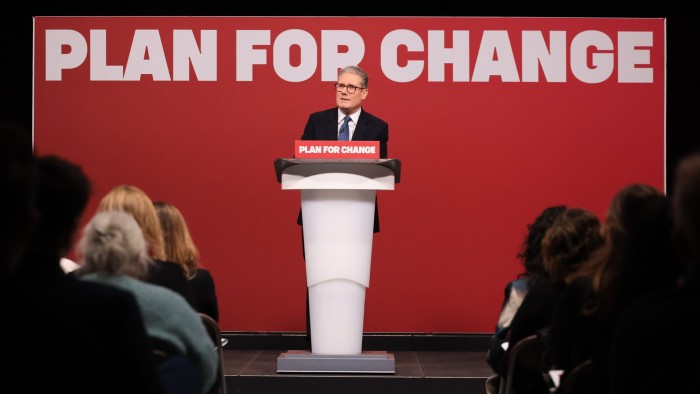Unlock the Editor’s Digest for free
Roula Khalaf, Editor of the FT, selects her favourite stories in this weekly newsletter.
Sir Keir Starmer has watered down one of his green targets as the UK prime minister attempts to reset his government after five difficult months in office.
As a part of a new set of policy “milestones” announced on Thursday, Labour laid out a goal for the UK to move to 95 per cent clean power by 2030, backtracking on a goal for “zero carbon electricity by 2030” that was promised in the party’s election manifesto.
The new wording brings Labour broadly in line with the last Conservative government, which also promised 95 per cent clean power by 2030 and 100 per cent by 2035.
Starmer’s team insisted his speech at Pinewood film studios near London was not a “relaunch” but an attempt to set out clearly his top priorities.
The series of new targets — ranging from policing to hospital operations — is partly an attempt to focus Whitehall on delivering the Labour government’s five missions: economic growth, clean energy, improving the NHS, safer streets and raising education standards.
Starmer said his “Plan for Change” document would land on the desk of civil servants “with the heavy thud of a gauntlet being thrown down”. He wanted to deploy the “full power of government” to deliver his objectives but added: “That’s precisely what’s broken.”
The much-trailed Plan for Change was conceived by Pat McFadden, chancellor of the Duchy of Lancaster, and Morgan McSweeney, Starmer’s chief of staff, as a means of convincing voters that the government is delivering.
Starmer’s poll ratings have slumped since Labour’s landslide victory in the July 4 general election.
But Starmer has been criticised for the carousel of initiatives. On top of the five missions and new milestones, in May he also set out six “first steps”, which included a measure to tackle irregular migration.
“Hard-working Brits are going out grafting every day but are getting short shrift from a politics that should serve them,” Starmer said.
The prime minister’s team fears that some of his original policy missions — notably the promise to make Britain the fastest-growing economy in the G7 by the end of Labour’s first term — are either hard to deliver or meaningless to voters.
The new economic “milestone” talks of “raising living standards in every part of the UK, so working people have more money in their pocket as we aim to deliver the highest sustained growth in the G7”.
The language relating to the G7 has also been diluted compared with Labour’s manifesto ambition to “have the highest growth in the G7 over consecutive years by the end of the parliament”.
Other milestones involve building 1.5mn homes in England and fast-tracking at least 150 major economic infrastructure projects. On the NHS, 92 per cent of patients should wait no longer than 18 weeks for elective treatment.
Starmer also pledged to put 13,000 new police officers, special constables or support officers on the street and ensure that 75 per cent of five-year-olds in England were “ready to learn when they start school”.
On green energy, one Labour figure insisted that the committee on climate change defined “zero carbon electricity” as at least 95 per cent low-carbon sources.
“On the Tory plan, they said 95 per cent of British electricity could be low-carbon but did not say how that would be achieved . . . We are saying at least 95 per cent and making it our proper target.”
He pointed to the Labour manifesto, which said the party wanted Britain to keep a strategic reserve of gas power stations.
Additional reporting by Rachel Millard


